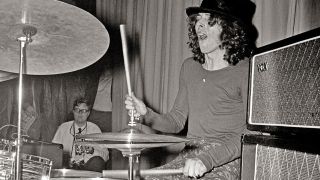I moved to London from Colchester in late 1964, so I was right there as the psych scene developed. It was such an exciting time, because there were no musical rules. Everyone was experimenting with different sounds, we all felt there was a creative freedom. Obviously, we were influenced by west coast bands like the Electric Prunes, but we took this as a starting point for our own variations on the garage sound.
There was a lot of camaraderie between bands in those days. The Marquee and the 100 Club were the two venues in London where most psych bands would play and we’d all go down. Afterwards we’d go on to after hours places like the Speakeasy or the Cromwellian Club, where we’d hang out until they shut. We’d then all go back to somebody’s flat to carry on partying.
During the day, you’d find a lot of musicians from this scene in Denmark Street, in the instrument shops. There was a great vibe in Tin Pan Alley in the 60s; we knew each other and everyone was prepared to help everybody else out. We also did a lot of jamming. I don’t think I went to a gig in those days without being invited to get on stage and join in. I wasn’t the only one – we had an attitude that we were all part of a greater movement, and that while we all had our own bands, this didn’t prevent you from playing with other musicians. I remember at one point being asked to sit in with the Jeff Beck Group at a rehearsal. Rod Stewart asked me, because their drummer Micky Waller hadn’t tuned up. This sort of thing went on all the time.
In the mid-60s the big names on the scene were The Animals, The Who, Pink Floyd and the Pretty Things but bands like The Action also made an impact. The London scene was different to the West Coast, because we reflected what was going on over here. Musically and lyrically we adapted what US bands were doing to suit our own situation. We never copied them. That’s the great thing about the era. We could be whoever and whatever we wanted.


